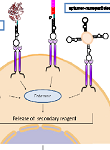|
|
|
Current Progress and Future Prospects of aptamer-based cancer therapy
|
|
|
|
|
|
|
|
|
|

|
|
|
Silvia Catuogno, and Carla L. Esposito.
|
|
|
|
Istituto di Endocrinologia ed Oncologia Sperimentale-CNR
|
Istituto di Endocrinologia ed Oncologia Sperimentale-CNR, Naples, Italy
|
|
c.esposito@ieos.cnr.it
|
|
|
|
|
|
|
|
|
|

|
Aptamers are short, structured, single-stranded RNA or DNA ligands that bind with high affinity to target molecules. They have a number of important advantages over proteins as therapeutic reagents. Most importantly they are rapidly isolated in vitro, show high specificity, low toxicity and non immunogenicity and can be easily stabilized by chemical modifications to improve their application in vivo.
To date an increasing number of aptamers have been generated with a great potential as cancer therapeutics. These first include inhibitory aptamers which bind to their target proteins directly hampering their function. In addition more recently, aptamers against cell surface molecules have been developed to specifically deliver different secondary reagents, including iRNAs, chemotherapeutic agents, toxins and nanoparticles to a cancer cells or tissues, thus increasing the efficacy of a given therapy as well as attenuating the overall toxicity.
In this article, we review recent advances in the use of aptamers for cancer therapy,......
|
|
|
|
|
|
|
|

|
|